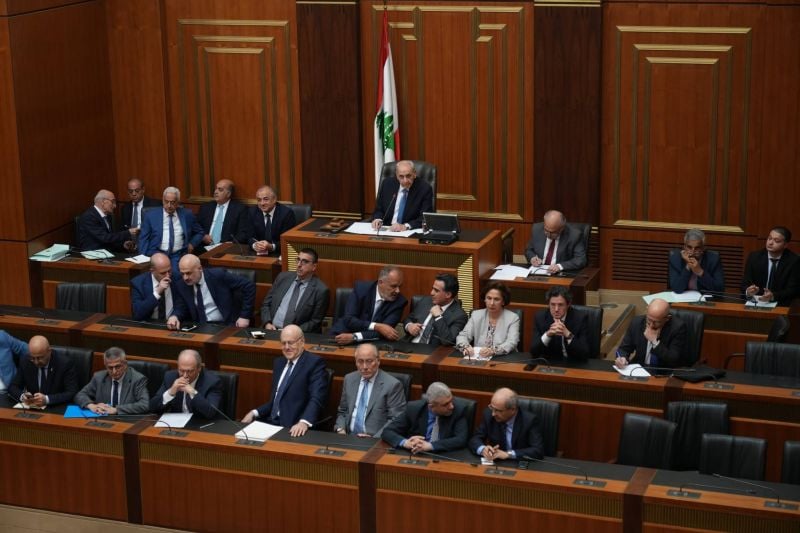
Parliament convenes to discuss the Syrian refugee issue, May 15, 2024. (Credit: Mohammad Yassine/L'Orient Today)
BEIRUT — In a parliamentary session on Wednesday addressing the Syrian refugee issue and the EU's €1 billion package deal, Caretaker Prime Minister Najib Mikati pledged to ramp up diplomatic efforts to tackle the country's ongoing refugee crisis, revealing that the president of the European Commission promised to increase the €1 billion package deal several-fold once reforms are passed.
"The issue of Syrian displacement to Lebanon is one of the issues on which the Lebanese people agree with one vision," Mikati claimed, speaking before the parliamentarians.
Politicians of all stripes regularly call for the repatriation and deportation of Syrians, of which there are an estimated 1.5 million who fled to Lebanon as refugees from the war in Syria, which continues to ravage parts of the country more than a decade later. Lebanese authorities claim that security conditions allow for such a return, while the United Nations and other rights groups warn that this is not the case.
The president of the European Commission, Ursula von der Leyen, announced on May 2, during a visit to Lebanon along with the Cypriot president, €1 billion in aid, designed to strengthen basic services such as education and health, for the crisis-hit country. Explicit in the deal was the understanding that Lebanon would, in turn, tackle illegal migration from Lebanese shores into Europe.
The European package "is nothing but a confirmation of the periodic assistance that the European Commission has provided to Lebanon for years," Mikati said, adding that the aid will be re-evaluated "every six months according to Lebanon's need."
The president of the European Commission promised to increase the initial amount several-fold and to make European investments in Lebanon, Mikati told MPs, "as soon as the required reform laws are passed."
'Unconditional aid'
Addressing criticisms that the aid package doubles as bribery, Mikati told Parliament that no agreement had been signed yet with the EU.
"I want to emphasize that this aid is not conditional on any prior or subsequent conditions... It is a continuation of previous aid."
Speaking in her capacity as lead candidate for the center-right European People's Party in the run up to June’s European elections, von der Leyen unveiled plans to set up a "European Democracy Shield" to protect the EU from foreign interference if she secures a second term at the helm of the Commission.
In his statement, Mikati said his government insisted that the assistance is aimed at encouraging Syrian refugees "to return to their country and not to remain in Lebanon, stressing that the largest part of Syria has become safe for return," adding that he stressed to the von der Leyen and the Cypriot president during their visit "that Lebanon cannot be considered a border police for any country."
Critics of the EU aid package claimed the money was meant to encourage Lebanon to continue hosting the 1.5 million Syrian refugees within its borders and to prevent them from continuing their migration into Europe.
Mikati also outlined measures he says his government is taking to tackle the refugees issue:
1. The Lebanese law to deport all illegal residents to their countries is to be enforced, provided that coordination is made with the United Nations High Commissioner for Refugees.
2. With regard to border security, the army has deployed four regiments along the Lebanese-Syrian border, with a border line of about 387 km, with a number of 4,838 members distributed among 108 centers, including 38 watchtowers equipped with cameras and night sensors. Mikati, however, said "in reality, five times the forces currently deployed are required to control the borders to a minimum, not to mention the human and logistical need to strengthen, monitor and control the maritime borders."
He added that security services are also closing illegal crossing points and confiscating the money used by smugglers.
3. The Interior Ministry issued a series of circulars to survey Syrians living within various municipalities. The circulars also require immediate reporting of any suspicious movements or gatherings related to displaced Syrians, and enforce strict suppression of violations related to shops that are invested within a municipality by Syrians without the necessary licenses, and work to close them immediately and refer violators to court.
4. With regard to the labor market, the Labor Ministry was asked to take strict legal measures against institutions and companies operating on Lebanese territory that violate the labor law and applicable regulations. Attempts to circumvent the legal texts with the aim of legislating foreign workers, especially by establishing fictitious commercial companies, is also being tackled.
5. Public prosecutors were asked to tighten legal procedures related to those involved in smuggling people and those entering Lebanon illegally and prosecuting them for the crime of human trafficking. The Justice Ministry was also requested to examine the possibility of extraditing convicts, prisoners and detainees.